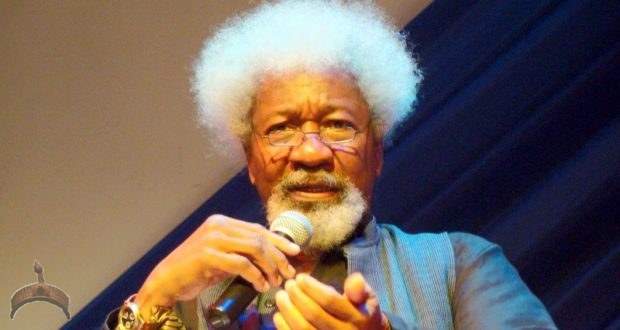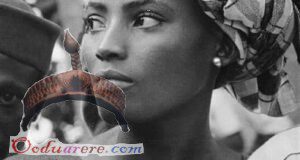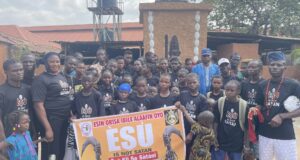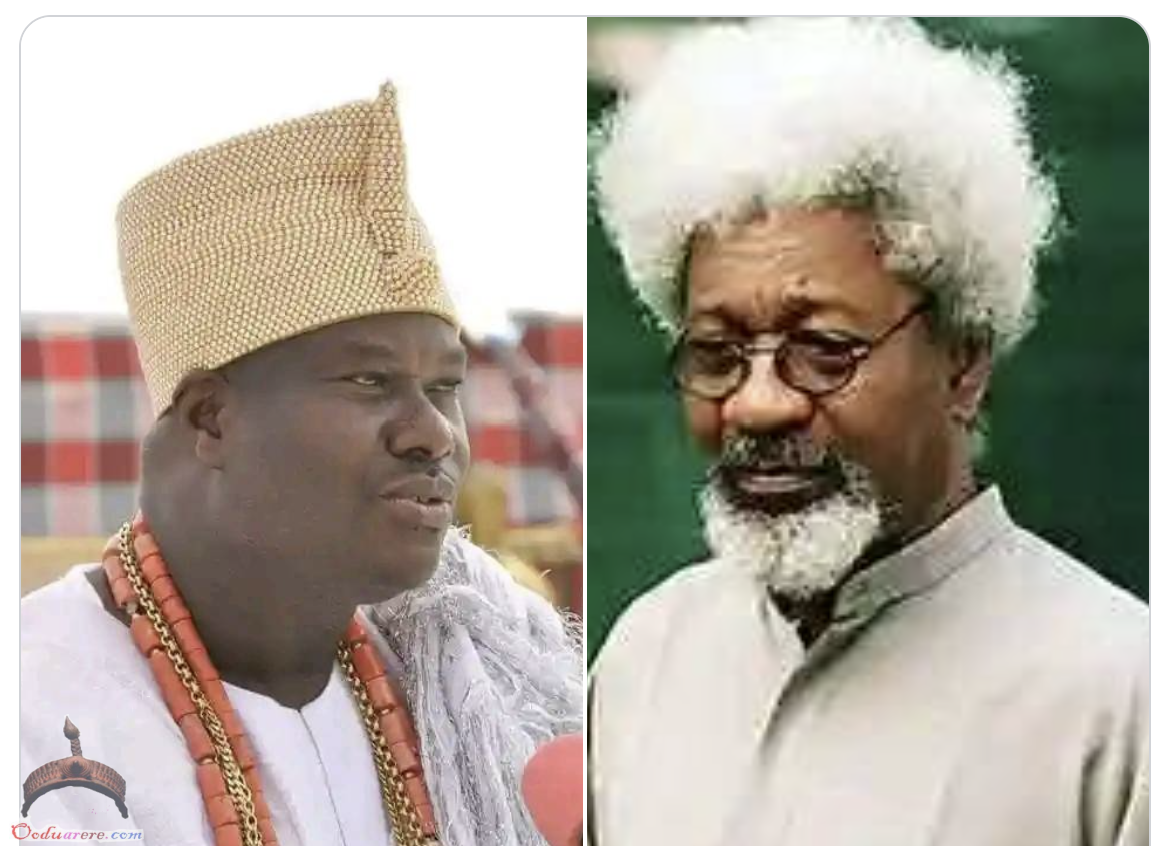Akinwande Oluwole Babatunde “Wole” Soyinka CFR Akínwándé Olúwọlé Babátúndé “Wọlé” Ṣóyínká, born 13 July 1934) is a Nigerian playwright, novelist, poet, and essayist in the English language. He was awarded the 1986 Nobel Prize in Literature for his “wide cultural perspective and… poetic overtones fashioning the drama of existence”, the first sub-Saharan African to win the Prize in literature.
Olúwọlé Ṣóyínká’s Early life
Soyinka was born into a Yoruba family in Abeokuta, Nigeria. In 1954, he attended Government College in Ibadan, and subsequently University College Ibadan and the University of Leeds in England. After studying in Nigeria and the UK, he worked with the Royal Court Theatre in London. He went on to write plays that were produced in both countries, in theatres and on radio. He took an active role in Nigeria’s political history and its campaign for independence from British colonial rule. In 1965, he seized the Western Nigeria Broadcasting Service studio and broadcast a demand for the cancellation of the Western Nigeria Regional Elections. In 1967, during the Nigerian Civil War, he was arrested by the federal government of General Yakubu Gowon and put in solitary confinement for two years, for volunteering to be a non-government mediating actor.
Soyinka has been a strong critic of successive Nigerian (and African at large) governments, especially the country’s many military dictators, as well as other political tyrannies, including the Mugabe regime in Zimbabwe. Much of Soyinka’s writing is concerned with “the oppressive boot and the irrelevance of the colour of the foot that wears it”. During the regime of General Sani Abacha (1993–98), Soyinka escaped from Nigeria on a motorcycle via the Benin border. Abacha later proclaimed a death sentence against him “in absentia”. With civilian rule restored to Nigeria in 1999, Soyinka returned there.
From 1975 to 1999, Soyinka had been Professor of Comparative literature (1975–1999) at Obafemi Awolowo University, then called the University of Ifẹ̀, and in 1999, he was made professor emeritus. While in the United States, he taught at Cornell University as Goldwin Smith professor for African Studies and Theatre Arts from 1988 to 1991 and then at Emory University, where in 1996 he was appointed Robert W. Woodruff Professor of the Arts. He has been a Professor of Creative Writing at the University of Nevada, Las Vegas, and has served as scholar-in-residence at New York University’s Institute of African American Affairs and at Loyola Marymount University in Los Angeles, California. He has also taught at the universities of Cambridge, Oxford, Harvard and Yale, and was a Distinguished Scholar in Residence at Duke University in 2008.
In December 2017, Soyinka received the Europe Theatre Prize in the “Special Prize” category, awarded to someone who has “contributed to the realization of cultural events that promote understanding and the exchange of knowledge between peoples”.
Literary Work
A descendant of the rulers of Isara, Soyinka was born the second of his parents’ seven children, in the city of Abẹokuta, Nigeria. His siblings were Atinuke “Tinu” Aina Soyinka, Femi Soyinka, Yeside Soyinka, Omofolabo “Folabo” Ajayi-Soyinka and Kayode Soyinka. His younger sister Folashade Soyinka died on her first birthday. His father, Samuel Ayodele Soyinka (whom he called S.A. or “Essay”), was an Anglican minister and the headmaster of St. Peters School in Abẹokuta. Having solid family connections, the elder Soyinka was a cousin of the Odemo, or King, of Isara-Remo Samuel Akinsanya, a founding father of Nigeria. Soyinka’s mother, Grace Eniola Soyinka (née Jenkins-Harrison) (whom he dubbed the “Wild Christian”), owned a shop in the nearby market.
She was a political activist within the women’s movement in the local community. She was also Anglican. As much of the community followed indigenous Yorùbá religious tradition, Soyinka grew up in a religious atmosphere of syncretism, with influences from both cultures. He was raised in a religious family, attending church services and singing in the choir from an early age; however, Soyinka himself became an atheist later in life. His father’s position enabled him to get electricity and radio at home. He writes extensively about his childhood in his memoir Aké: The Years of Childhood (1981).
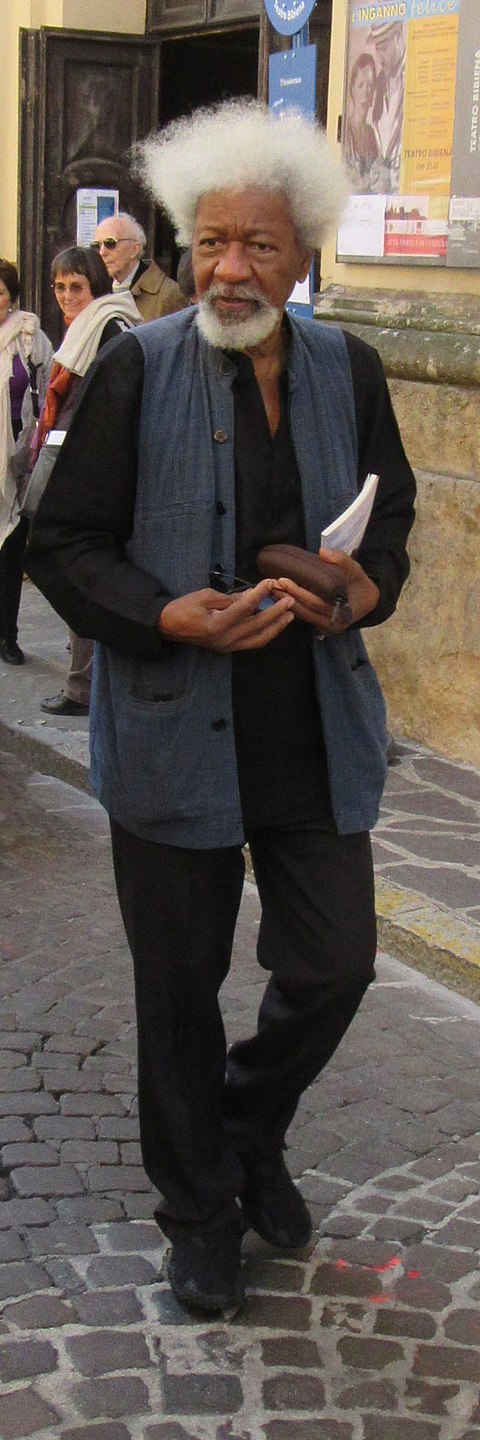
His mother was one of the most prominent members of the influential Ransome-Kuti family: she was the granddaughter of Rev. Canon J. J. Ransome-Kuti as the only daughter of his first daughter Anne Lape Iyabode Ransome-Kuti, and was therefore a niece to Olusegun Azariah Ransome-Kuti, Oludotun Ransome-Kuti and niece in-law to Funmilayo Ransome-Kuti. Among Soyinka’s first cousins once removed were the musician Fela Kuti, the human rights activist Beko Ransome-Kuti, politician Olikoye Ransome-Kuti and activist Yemisi Ransome-Kuti. His second cousins include musicians Femi Kuti and Seun Kuti, and dancer Yeni Kuti. His younger brother Femi Soyinka became a medical doctor and a university professor.
In 1940, after attending St. Peter’s Primary School in Abeokuta, Soyinka went to Abeokuta Grammar School, where he won several prizes for literary composition. In 1946 he was accepted by Government College in Ibadan, at that time one of Nigeria’s elite secondary schools. After finishing his course at Government College in 1952, he began studies at University College Ibadan (1952–54), affiliated with the University of London. He studied English literature, Greek, and Western history. Among his lecturers was Molly Mahood, a British literary scholar. In the year 1953–54, his second and last at University College, Soyinka began work on Keffi’s Birthday Treat, a short radio play for Nigerian Broadcasting Service that was broadcast in July 1954. While at university, Soyinka and six others founded the Pyrates Confraternity, an anti-corruption and justice-seeking student organisation, the first confraternity in Nigeria.
Later in 1954, Soyinka relocated to England, where he continued his studies in English literature, under the supervision of his mentor Wilson Knight at the University of Leeds (1954–57). He met numerous young, gifted British writers. Before defending his B.A. degree, Soyinka began publishing and working as editor for a satirical magazine called The Eagle; he wrote a column on academic life, in which he often criticised his university peers.
Early Career
After graduating with an upper second-class degree, Soyinka remained in Leeds and began working on an MA. He intended to write new works combining European theatrical traditions with those of his Yorùbá cultural heritage. His first major play, The Swamp Dwellers (1958), was followed a year later by The Lion and the Jewel, a comedy that attracted interest from several members of London’s Royal Court Theatre. Encouraged, Soyinka moved to London, where he worked as a play reader for the Royal Court Theatre. During the same period, both of his plays were performed in Ibadan. They dealt with the uneasy relationship between progress and tradition in Nigeria.
In 1957, his play The Invention was the first of his works to be produced at the Royal Court Theatre. At that time his only published works were poems such as “The Immigrant” and “My Next Door Neighbour”, which were published in the Nigerian magazine Black Orpheus. This was founded in 1957 by the German scholar Ulli Beier, who had been teaching at the University of Ibadan since 1950.
Soyinka received a Rockefeller Research Fellowship from University College in Ibadan, his alma mater, for research on African theatre, and he returned to Nigeria. After its fifth issue (November 1959), Soyinka replaced Jahnheinz Jahn to become coeditor for the literary periodical Black Orpheus (its name derived from a 1948 essay by Jean-Paul Sartre, “Orphée Noir”, published as a preface to Anthologie de la nouvelle poésie nègre et malgache, edited by Léopold Senghor). He produced his new satire, The Trials of Brother Jero in the dining-hall at Mellanby Hall of University College Ibadan, in April 1960. That year, his work A Dance of The Forest, a biting criticism of Nigeria’s political elites, won a contest that year as the official play for Nigerian Independence Day. On 1 October 1960, it premiered in Lagos as Nigeria celebrated its sovereignty. The play satirizes the fledgling nation by showing that the present is no more a golden age than was the past. Also in 1960, Soyinka established the “Nineteen-Sixty Masks”, an amateur acting ensemble to which he devoted considerable time over the next few years.
Soyinka wrote the first full-length play produced on Nigerian television. Entitled My Father’s Burden and directed by Segun Olusola, the play was featured on the Western Nigeria Television (WNTV) on 6 August 1960. Soyinka published works satirising the “Emergency” in the Western Region of Nigeria, as his Yorùbá homeland was increasingly occupied and controlled by the federal government. The political tensions arising from recent post-colonial independence eventually led to a military coup and civil war (1967–70).
With the Rockefeller grant, Soyinka bought a Land Rover, and he began travelling throughout the country as a researcher with the Department of English Language of the University College in Ibadan. In an essay of the time, he criticised Leopold Senghor’s Négritude movement as a nostalgic and indiscriminate glorification of the black African past that ignores the potential benefits of modernisation. He is often quoted as having said, “A tiger doesn’t proclaim his tigritude, he pounces.” But in fact, Soyinka wrote in a 1960 essay for the Horn: “the duiker will not paint ‘duiker’ on his beautiful back to proclaim his duikeritude; you’ll know him by his elegant leap.” In Death and the King’s Horsemen he states: “The elephant trails no tethering-rope; that king is not yet crowned who will peg an elephant.”
In December 1962, Soyinka’s essay “Towards a True Theater” was published in Transition Magazine. He began teaching with the Department of English Language at Obafemi Awolowo University in Ifẹ. He discussed current affairs with “négrophiles”, and on several occasions openly condemned government censorship. At the end of 1963, his first feature-length movie, Culture in Transition, was released. In 1965, his book The Interpreters, “a complex but also vividly documentary novel”, was published in London by André Deutsch.
That December, together with scientists and men of theatre, Soyinka founded the Drama Association of Nigeria. In 1964 he also resigned his university post, as a protest against imposed pro-government behaviour by the authorities. A few months later, in 1965, he was arrested for the first time, charged with holding up a radio station at gunpoint (as described in his 2006 memoir You Must Set Forth at Dawn) and replacing the tape of a recorded speech by the premier of Western Nigeria with a different tape containing accusations of election malpractice. Soyinka was released after a few months of confinement, as a result of protests by the international community of writers. This same year he wrote two more dramatic pieces: Before the Blackout and the comedy Kongi’s Harvest. He also wrote The Detainee, a radio play for the BBC in London. His play The Road premiered in London at the Commonwealth Arts Festival, opening on 14 September 1965, at the Theatre Royal. At the end of the year, he was promoted to headmaster and senior lecturer in the Department of English Language at University of Lagos.
Soyinka’s political speeches at that time criticised the cult of personality and government corruption in African dictatorships. In April 1966, his play Kongi’s Harvest was produced in revival at the World Festival of Negro Arts in Dakar, Senegal. The Road was awarded the Grand Prix. In June 1965, his play The Trials of Brother Jero was produced at the Hampstead Theatre Club in London, and in December 1966 The Lion and the Jewel was staged at the Royal Court Theatre.
Civil war and imprisonment
After becoming Chair of Drama at the University of Ibadan, Soyinka became more politically active. Following the military coup of January 1966, he secretly met with Chukwuemeka Odumegwu Ojukwu, the military governor in the Southeastern Nigeria in an effort to avert the Nigerian civil war.
He was later arrested by federal authorities and imprisoned for 22 months, as civil war ensued between the Federal government of Nigeria and the secessionist state of Biafra. He wrote a significant body of poems and notes criticising the Nigerian government while in prison.
Despite his imprisonment, his play The Lion and The Jewel was produced in Accra, Ghana, in September 1967. In November that year, The Trials of Brother Jero and The Strong Breed were produced in the Greenwich Mews Theatre in New York City. Soyinka also published a collection of his poetry, Idanre and Other Poems, which was inspired by his visit to the sanctuary of the Yorùbá deity Ogun, whom he regards as his “companion” deity, kindred spirit, and protector.
In 1968, the Negro Ensemble Company in New York produced Kongi’s Harvest. While still imprisoned, Soyinka translated from Yoruba a fantastical novel by his compatriot D. O. Fagunwa, entitled The Forest of a Thousand Demons: A Hunter’s Saga.
Two films about this period of his life have been announced: The Man Died, directed by Awam Amkpa, a feature film based on a fictionalized form of Soyinka’s 1973 prison memoirs of the same name; and Ebrohimie Road, written and directed by Kola Tubosun, which takes a look at the house where Soyinka lived between 1967 when he arrived back in Ibadan to take on the directorship of the School of Drama and 1972 when he left for exile after being released from prison.
Release and literary production
In October 1969, when the civil war came to an end, amnesty was proclaimed, and Soyinka and other political prisoners were freed. For the first few months after his release, Soyinka stayed at a friend’s farm in southern France, where he sought solitude. He wrote The Bacchae of Euripides (1969), a reworking of the Pentheus myth. He soon published in London a book of poetry, Poems from Prison. At the end of the year, he returned to his office as Chair of Drama at Ibadan.
In 1970, he produced the play Kongi’s Harvest, while simultaneously adapting it as a film of the same title. In June 1970, he finished another play, called Madmen and Specialists. Together with the group of 15 actors of Ibadan University Theatre Art Company, he went on a trip to the United States, to the Eugene O’Neill Memorial Theatre Center in Waterford, Connecticut, where his latest play premiered. It gave them all experience with theatrical production in another English-speaking country.
In 1971, his poetry collection A Shuttle in the Crypt was published. Madmen and Specialists was produced in Ibadan that year. Soyinka travelled to Paris to take the lead role as Patrice Lumumba, the murdered first Prime Minister of the Republic of the Congo, in the production of Murderous Angels, Conor Cruise O’Brien’s play about the Congo Crisis.
In April 1971, concerned about the political situation in Nigeria, Soyinka resigned from his duties at the University in Ibadan, and began years of voluntary exile. In July in Paris, excerpts from his well-known play The Dance of The Forests were performed.
In 1972, his novel Season of Anomy and his Collected Plays were both published by Oxford University Press. His powerful autobiographical work The Man Died, a collection of notes from prison, was also published that year. He was awarded an Honoris Causa doctorate by the University of Leeds in 1973. In the same year the National Theatre, London, commissioned and premiered the play The Bacchae of Euripides, and his plays Camwood on the Leaves and Jero’s Metamorphosis were also first published. From 1973 to 1975, Soyinka spent time on scientific studies.[clarification needed] He spent a year as a visiting fellow at Churchill College, Cambridge University [clarification needed] 1973–74 and wrote Death and the King’s Horseman, which had its first reading at Churchill College.
In 1974, his Collected Plays, Volume II was issued by Oxford University Press. In 1975, Soyinka was promoted to the position of editor for Transition Magazine, which was based in the Ghanaian capital of Accra, where he moved for some time. He used his columns in the magazine to criticise the “negrophiles” (for instance, his article “Neo-Tarzanism: The Poetics of Pseudo-Transition”) and military regimes. He protested against the military junta of Idi Amin in Uganda. After the political turnover in Nigeria and the subversion of Gowon’s military regime in 1975, Soyinka returned to his homeland and resumed his position as Chair of Comparative Literature at the University of Ife.
In 1976, he published his poetry collection Ogun Abibiman, as well as a collection of essays entitled Myth, Literature and the African World. In these, Soyinka explores the genesis of mysticism in African theatre and, using examples from both European and African literature, compares and contrasts the cultures. He delivered a series of guest lectures at the Institute of African Studies at the University of Ghana in Legon. In October, the French version of The Dance of The Forests was performed in Dakar, while in Ife, his play Death and The King’s Horseman premièred.
In 1977, Opera Wọnyọsi, his adaptation of Bertolt Brecht’s The Threepenny Opera, was staged in Ibadan. In 1979 he both directed and acted in Jon Blair and Norman Fenton’s drama The Biko Inquest, a work based on the life of Steve Biko, a South African student and human rights activist who was beaten to death by apartheid police forces. In 1981 Soyinka published his autobiographical work Aké: The Years of Childhood, which won a 1983 Anisfield-Wolf Book Award.
Soyinka founded another theatrical group called the Guerrilla Unit. Its goal was to work with local communities in analysing their problems and to express some of their grievances in dramatic sketches. In 1983 his play Requiem for a Futurologist had its first performance at the University of Ife. In July, one of his musical projects, the Unlimited Liability Company, issued a long-playing record entitled I Love My Country, on which several prominent Nigerian musicians played songs composed by Soyinka. In 1984, he directed the film Blues for a Prodigal, which was screened at the University of Ife. His A Play of Giants was produced the same year.
During the years 1975–84, Soyinka was more politically active. At the University of Ife, his administrative duties included the security of public roads. He criticized the corruption in the government of the democratically elected President Shehu Shagari. When he was replaced by the army general Muhammadu Buhari, Soyinka was often at odds with the military. In 1984, a Nigerian court banned his 1972 book The Man Died: Prison Notes. In 1985, his play Requiem for a Futurologist was published in London by Rex Collings.
Religion
In November 2022, during a public presentation of his two-volume collection of essays, Soyinka said in relation to religion:
“Do I really need one (religion)? I have never felt I needed one. I am a mythologist… No, I don’t worship any deity. But I consider deities as creatively real and therefore my companions in my journey in both the real world and the imaginative world.”
Around July 2023, Soyinka came under severe criticism, after writing an open letter to the Emir of Ilorin, Ibrahim Sulu-Gambari, over the cancellation of the Isese festival proposed by an Osun priestess, Omolara Olatunji.
 Ọmọ Oòduà Naija Gist | News From Nigeria | Entertainment gist Nigeria|Networking|News.. Visit for Nigeria breaking news , Nigerian Movies , Naija music , Jobs In Nigeria , Naija News , Nollywood, Gist and more
Ọmọ Oòduà Naija Gist | News From Nigeria | Entertainment gist Nigeria|Networking|News.. Visit for Nigeria breaking news , Nigerian Movies , Naija music , Jobs In Nigeria , Naija News , Nollywood, Gist and more

